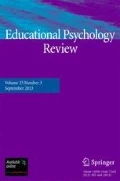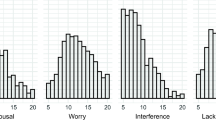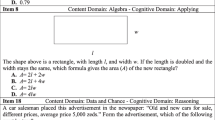Abstract
Test anxiety is a context-specific academic anxiety which can result in poorer academic and metacognitive performance. We assessed how the quantity and relative weight of assessments contribute to the effects of test anxiety on performance and metacognitive accuracy in a smaller seminar-style class on human memory (study 1) and a larger lecture-style class on cognitive psychology (study 2). Students took six low-stakes quizzes each worth 10% of their final grade in study 1 and two high-stakes exams each worth 40% of their final grade in study 2. All students provided their state anxiety and predicted their scores before and after each assessment. Students in both classes also provided their trait (overall) anxiety after the final assessment. In both studies, students’ higher post-state anxiety appeared to be associated with worse assessment performance; however, pre- and post-state anxiety decreased across the quarter in study 1 but remained constant in study 2. Additionally, we found that metacognitive accuracy moderated the effect of post-state anxiety on performance in study 1. Students with higher trait anxiety in study 1 were underconfident in their scoring predictions, while in study 2 students with higher trait anxiety performed worse on their assessments. Thus, students’ metacognitive accuracy appears to be influenced by trait anxiety when taking low-stakes quizzes, while performance is related to trait anxiety when taking high-stakes exams.





Similar content being viewed by others
Data Availability
Data and survey materials are available via OSF (https://osf.io/pv89n/).
References
Argarwal, P. K., D’Antonio, L., Roediger, H. L. I., McDermott, K. B., & McDaniel, M. A. (2014). Classroom-based programs of retrieval practice reduce middle school and high school students’ test anxiety. Journal of Applied Research in Memory and Cognition, 3(3), 131–139.
Birenbaum, M., & Feldman, R. A. (1998). Relationships between learning patterns and attitudes towards two assessment formats. Educational Research, 40(1), 90–98.
Bjork, R. A. (1994). Memory and metamemory considerations in the training of human beings. In J. Metcalfe & A. P. Shimamura (Eds.), Metacognition: knowing about knowing (pp. 185–205). MIT Press.
Bowman, A. W., Jones, M. C., & Gijbels, I. (1998). Testing monotonicity of regression. Journal of Computational and Graphical Statistics, 7(4), 489–500.
Callender, A. A., Franco-Watkins, A. M., & Roberts, A. S. (2016). Improving metacognition in the classroom through instruction, training, and feedback. Metacognition and Learning, 11(2), 215–235.
Cassady, J. C. (2004). The impact of test anxiety on text comprehension and recall in the absence of external evaluative pressure. Applied Cognitive Psychology, 18(3), 311–325.
Cassady, J. C. (2010). Test anxiety: contemporary theories and implications for learning. In J. C. Cassady (Ed.), Anxiety in schools: the causes, consequences, and solutions for academic anxieties (pp. 7–26). Peter Lang.
Cassady, J. C., & Johnson, R. E. (2002). Cognitive test anxiety and academic performance. Contemporary educational anxiety, 27, 270–295.
Cizek, G. J., & Burg, S. S. (2006). Addressing test anxiety in a high-stakes environment: strategies for classrooms and schools. Corwin Press.
Covington, M. V. (1985). Test anxiety: causes and effects over time. In H. M. van der Ploeg, R. Schwarzer, & C. D. Spielberger (Eds.), Advances in test anxiety research (Vol. 4, pp. 55–68). Swets & Zeitlinger.
Davey, H. M., Barratt, A. L., Butow, P. N., & Deeks, J. J. (2007). A one-item question with a Likert or Visual Analog Scale adequately measured current anxiety. Journal of Clinical Epidemiology, 60(4), 356–360.
Deci, E. L., Koestner, R., & Ryan, R. M. (1999). A meta-analytic review of experiments examining the effects of extrinsic rewards on intrinsic motivation. Psychological Bulletin, 125(6), 627–668.
Dunlosky, J., Rawson, K. A., Marsh, E. J., Nathan, M. J., & Willingham, D. T. (2013). Improving students’ learning with effective learning techniques: promising directions from cognitive and educational psychology. Psychological Science in the Public Interest, 14(1), 4–58.
Dunn, D. S., Saville, B. K., Baker, S. C., & Marek, P. (2013). Evidence-based teaching: tools and techniques that promote learning in the psychology classroom. Australian. Journal of Psychology, 65(1), 5–13.
Elliot, A. J., & McGregor, H. A. (1999). Test anxiety and the hierarchical model of approach and avoidance achievement motivation. Journal of Personality and Social Psychology, 76(4), 628–644.
Everson, H. T., Smodlaka, I., & Tobias, S. (1994). Exploring the relationship of test anxiety and metacognition on reading test performance: a cognitive analysis. Anxiety, stress, and coping, 7(1), 85–96.
Fernández-Castillo, A., & Caurcel, M. J. (2015). State test-anxiety, selective attention and concentration in university students. International Journal of Psychology, 50(4), 265–271.
Goetz, T., Bieg, M., Lüdtke, O., Pekrun, R., & Hall, N. C. (2013). Do girls really experience more anxiety in mathematics? Psychological Science, 24(10), 2079–2087.
Harris, R. B., Grunspan, D. Z., Pelch, M. A., Fernandes, G., Ramirez, G., & Freeman, S. (2019). Can test anxiety interventions alleviate a gender gap in an undergraduate STEM course? CBE—Life Sciences Education, 18, 1–9.
Hembree, R. (1988). Correlates, causes, effect, and treatment of test anxiety. Review of Educational Research, 58(1), 47–77.
Karpicke, J. D. (2017). Retrieval-based learning: a decade of progress. In J. T. Wixted (Ed.), Cognitive psychology of memory, of learning and memory: a comprehensive reference (Vol. 2, pp. 487–514). Oxford: Academic Press.
Koriat, A., Sheffer, L., & Ma’ayan, H. (2002). Comparing objective and subjective learning curves: judgments of learning exhibit increased underconfidence with practice. Journal of Experimental Psychology: General, 131(2), 147–162.
Kurosawa, K., & Harackiewicz, J. M. (1995). Test anxiety, self-awareness, and cognitive interference: a process analysis. Journal of Personality, 63(4), 931–951.
Lantz, P. M., House, J. S., Mero, R. P., & Williams, D. R. (2005). Stress, life events, and socioeconomic disparities in health: results from the Americans’ Changing Lives Study. Journal of Health and Social Behavior, 46(3), 274–288.
Leadbeater, B., Thompson, K., & Gruppuso, V. (2012). Co-occurring trajectories of symptoms of anxiety, depression, and oppositional defiance from adolescence to young adulthood. Journal of Clinical Child & Adolescent Psychology, 41(6), 719–730.
Legg, A. M., & Locker, L. (2009). Math performance and its relationship to math anxiety and metacognition. North American Journal of Psychology, 11, 471–486.
Maloney, E. A., Ramirez, G., Gunderson, E. A., Levine, S. C., & Beilock, S. L. (2015). Intergenerational effects of parents’ math anxiety on children’s math achievement and anxiety. Psychological Science, 26(9), 1480–1488.
Mueller, J. H. (1980). Test anxiety and the encoding and retrieval of information. In I. G. Sarason (Ed.), Test anxiety: theory, research, and applications (pp. 63–86). Erlbaum.
Mulvenon, S. W., Connors, J. V., & Lenares, D. (2001). Impact of accountability and school testing on students: is there evidence of anxiety?.
Mulvenon, S. W., Stegman, C. E., & Ritter, G. (2005). Test anxiety: a multifaceted study on the perceptions of teachers, principals, counselors, students, and parents. International Journal of Testing, 5(1), 37–61.
Naveh-Benjamin, M. (1991). A comparison of training programs intended for different types of test anxious students: further support for an information-processing model. Journal of Educational Psychology, 83(1), 134–139.
Núñez-Peña, M. I., Suárez-Pellicioni, M., Guilera, G., & Mercadé-Carranza, C. (2013). A Spanish version of the short Mathematics Anxiety Rating Scale (sMARS). Learning and Individual Differences, 24, 204–210.
Putwain, D. W. (2008). Deconstructing test anxiety. Emotional and Behavioural Difficulties, 13(2), 141–155.
Putwain, D. W., & Best, N. (2011). Fear appeals in the primary classroom: effects on test anxiety and test grade. Learning and Individual Differences, 21(5), 580–584.
Putwain, D. W., Kearsley, R., & Symes, W. (2012). Do creativity self-beliefs predict literacy achievement and motivation? Learning and Individual Differences, 22(3), 370–374.
Ratelle, C. F., Guay, F., Vallerand, R. J., Larose, S., & Senécal, C. (2007). Autonomous, controlled, and amotivated types of academic motivation: a person-oriented analysis. Journal of Educational Psychology, 99(4), 734–746.
Roediger, H. L., & Karpicke, J. D. (2006). Test-enhanced learning: taking memory tests improves long-term retention. Psychological Science, 17(3), 249–255.
Ryan, R. M., & Weinstein, N. (2009). Undermining quality teaching and learning: a self- determination theory perspective on high-stakes testing. Theory and Research in Education, 7(2), 224–233.
Schwarzer, R., & Jerusalem, M. (1992). Advances in anxiety theory: a cognitive process approach. In K. A. Hagtvet & T. B. Johnsen (Eds.), Advances in test anxiety research (Vol. 7, pp. 2–31). Swets & Zeitlinger.
Segool, N. K., Carlson, J. S., Goforth, A. N., von der Embse, N., & Barterian, J. A. (2013). Heightened test anxiety among young children: elementary school students’ anxious responses to high-stakes testing. Psychology in the Schools, 50(5), 489–499.
Simonsohn, U. (2018). Two lines: a valid alternative to the invalid testing of U-shaped relationships with quadratic regressions. Advances in Methods and Practices in Psychological Science, 1(4), 538–555.
Spada, M. M., Nikcevic, A. V., Moneta, G. B., & Ireson, J. (2006). Metacognition as a mediator of the effect of test anxiety on a surface approach to studying. Educational Psychology, 26(5), 615–624.
Spielberger, C. (1972). Anxiety as an emotional state. In C. D. Spielberger (Ed.), Anxiety: current trends in theory and research (Vol. 1, pp. 23–49). Academic Press.
Triplett, C. F., & Barksdale, M. A. (2005). Third through sixth graders’ perceptions of high- stakes testing. Journal of Literacy Research, 37(2), 237–260.
Vansteenkiste, M., Simons, J., Lens, W., Sheldon, K. M., & Deci, E. L. (2004). Motivating learning, performance, and persistence: the synergistic effects of intrinsic goal contents and autonomy-supportive contexts. Journal of Personality and Social Psychology, 87(2), 246–260.
Veenman, M. V. J., Kerseboom, L., & Imthorn, C. (2000). Test anxiety and metacognitive skillfulness: availability versus production deficiencies. Anxiety, Stress, and Coping, 13(4), 391–412.
von der Embse, N., & Hasson, R. (2012). Test anxiety and high-stakes test performance between school settings: implications for educators. Preventing school failure: alternative education for children and youth, 56(3), 180–187.
von der Embse, N., Jester, D., Roy, D., & Post, J. (2018). Test anxiety effects, predictors, and correlates: a 30-year meta-analytic review. Journal of Affective Disorders, 227, 483–493.
Williams, J. E. (1991). Modeling test anxiety, self-concept and high school students’ academic achievement. Journal of Research & Development in Education, 25(1), 51–57.
Wood, S. G., Hart, S., Little, S., & Phillips, S. A. (2016). Test anxiety and a high-stakes standardized reading comprehension test: a behavioral genetics perspective. Merrill-Palmer Quarterly, 62(3), 233–251.
Yang, C., Sun, B., Potts, R., Yu, R., Luo, L., & Shanks, D. R. (2020). Do working memory capacity and test anxiety modulate the beneficial effects of testing on new learning? Journal of Experimental Psychology: Applied Advance online publication.
Yue, X. (1996). Test anxiety and self-efficacy: Levels and relationship among secondary school students in Hong Kong. Psychologia: An International Journal of Psychology in the Orient, 39(3), 193–202.
Zohar, D. (1998). An additive model of test anxiety: role of exam-specific expectations. Journal of Educational Psychology, 90(2), 330–340.
Acknowledgements
We thank Gerardo Ramirez, Barbara Knowlton, Robert Bjork, Elizabeth Bjork, and Courtney Clark for helpful comments regarding this work. We also thank Mary Hargis, Dillon Murphy, Julia Schorn, Mary Whatley, and the rest of the members of the Memory and Lifespan Cognition Laboratory at UCLA for their guidance and support.
Code Availability
No custom code or software were written for this project. Code to run analyses in R are provided in the OSF link below.
Funding
This research was supported in part by the National Institutes of Health (National Institute on Aging; Award Number R01 AG044335 to Dr. Alan Castel).
Author information
Authors and Affiliations
Contributions
A. D. Castel and A. L. M. Siegel conceived of the study. A. L. M. Siegel collected the data, and S. T. Schwartz analyzed the data with A. L. M. Siegel and K. M. Silaj. K. M. Silaj and S. T. Schwartz wrote the manuscript. A. L. M. Siegel and A. D. Castel contributed to the editing of the manuscript.
Corresponding author
Ethics declarations
Conflict of Interest
The authors declare no competing interests.
Additional information
Publisher’s Note
Springer Nature remains neutral with regard to jurisdictional claims in published maps and institutional affiliations.
Rights and permissions
About this article
Cite this article
Silaj, K.M., Schwartz, S.T., Siegel, A.L.M. et al. Test Anxiety and Metacognitive Performance in the Classroom. Educ Psychol Rev 33, 1809–1834 (2021). https://doi.org/10.1007/s10648-021-09598-6
Accepted:
Published:
Issue Date:
DOI: https://doi.org/10.1007/s10648-021-09598-6




